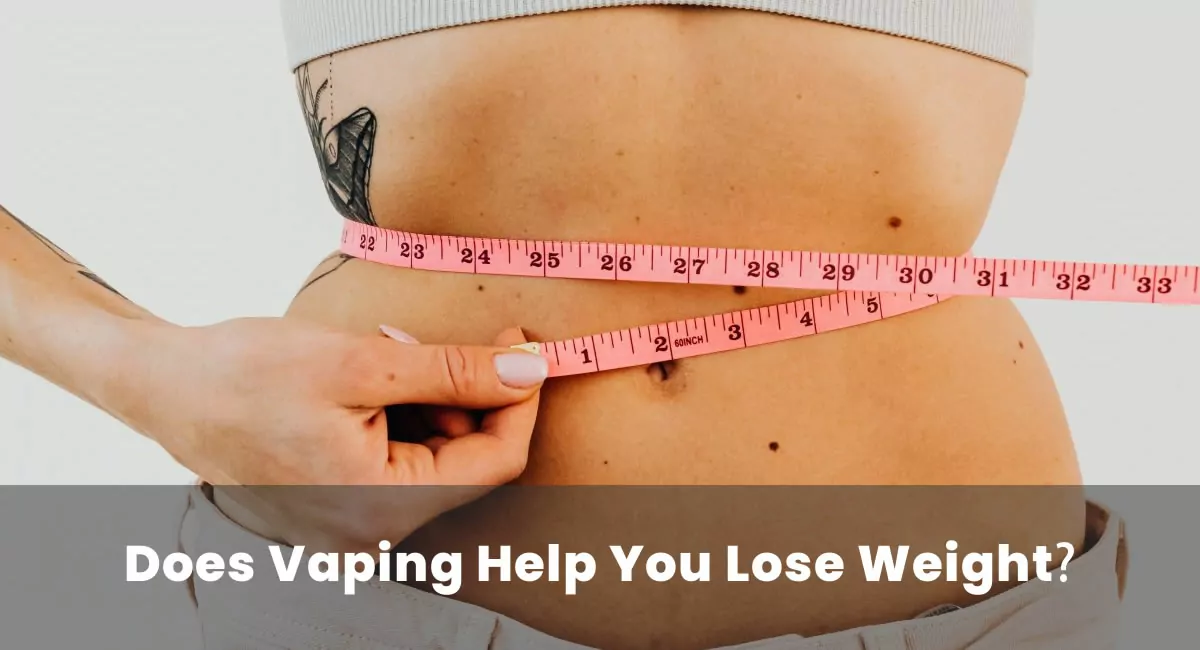Does Vaping Help You Lose Weight? The Surprising Truth
The nicotine in the vapes may help prevent weight gain and make you lose weight. However, it’s important to note that vaping should not be seen as a standalone solution for weight management. It should be used in conjunction with a balanced diet and a healthy lifestyle to achieve sustainable results.

Vaping has become an incredibly popular habit over the past decade. With sleek, high-tech devices and a myriad of e-juice flavors to choose from, it’s easy to see why vaping has appealed to so many people.
But does vaping actually help you lose weight? While some claim that vaping can be an appetite suppressant and lead to weight loss, the science is still unclear.
This in-depth article will explore the potential connection between vaping and weight loss, looking at the evidence on both sides of the debate. We’ll cover topics like:
- How vaping affects appetite and eating habits
- The impact of vaping on metabolism
- Vaping as a cigarette replacement for weight control
- Potential downsides and health considerations
By the end, you’ll have a thorough understanding of the arguments surrounding vaping and weight loss. Let’s dive in!
Does Vaping Curb Your Appetite?
One of the most common claims about vaping is that it can suppress appetite and food cravings. For those trying to lose weight, this would seem like an obvious benefit.
But what does the research actually say?
Several small studies have found evidence that vaping can reduce appetite and cravings:
- According to a population study conducted in England in 2019, it was found that approximately 1 in 22 people use vaping as a means of weight control. Additionally, 1 in 50 individuals employ vaping to replace meals or snacks. This suggests that there is a significant subset of the population relying on vaping to help manage their weight.
- Scientific evidence supports the idea that nicotine can reduce weight gain in the short term. Nicotine acts as an appetite suppressant, potentially diminishing hunger pangs when vapes containing nicotine are used. This appetite-suppressing effect can contribute to weight loss efforts, as individuals may consume fewer calories.
- In a recent study from 2021, researchers discovered that nicotine not only reduces appetite but also decreases food intake and body weight. These findings further emphasize the potential role of nicotine in weight management.
While the exact mechanisms underlying nicotine’s impact on weight regulation remain unclear, several theories have been proposed. One possibility is that nicotine alters appetite regulation, affecting how individuals perceive hunger and satiety. This alteration in appetite signaling could lead to reduced food intake and subsequently contribute to weight loss.
Additionally, nicotine may increase energy burning during periods of rest and physical activity. This elevated energy expenditure could help individuals burn calories more efficiently and potentially offset weight gain.
Apart from the direct effects of nicotine, vaping behavior itself may also influence weight control. The hand-to-mouth action involved in vaping can occupy individuals, serving as a distraction from habitual eating patterns. By diverting attention away from snacking or overeating, vaping may help reduce the overall amount of food consumed.
Read more:
Can Vaping Boost Your Metabolism?
Another alleged weight loss benefit of vaping is that it boosts metabolism. The logic is that nicotine stimulates metabolism, just like caffeine does.
Unfortunately, there’s very little research into vaping’s effects on metabolism and weight loss specifically. We can draw some clues from broader nicotine and vaping studies:
- Nicotine has been shown to raise resting metabolic rate by around 5% temporarily after use. However, these effects may diminish as tolerance builds.
- One study found vaping for 10 minutes increased energy expenditure by around 10 calories. But the long term effects are unknown.
- Research has found vapers gain less weight than non-users over time. But this was an observational study, so can’t prove cause and effect.
While it’s plausible that vaping and nicotine may give metabolism a slight boost, the size and duration of this effect is unlikely to translate into significant weight loss for most people. Exercise and nutrition will play a far bigger role for the majority of users.
How Does Vaping Compare to Smoking for Weight Control?
One of the most compelling reasons people take up vaping is to quit smoking and reduce health risks. But when it comes to managing weight, how does vaping compare to smoking?
There are a few key points to consider:
- Smoking suppresses appetite more substantially. Studies consistently show stronger appetite and craving reduction from smoking versus vaping. This is likely due to other compounds in cigarette smoke.
- Smoking raises metabolism more. While vaping can increase resting metabolic rate, the effect is generally lower than that of traditional cigarettes.
- Smoking is very unhealthy. The appetite and metabolic impacts of smoking come with severe health consequences like lung disease, cancer, and heart problems.
- Vaping may avoid some of these risks. By delivering nicotine without combustion, vaping avoids much of the toxic smoke from cigarettes. But the long term health effects of vaping are still unknown.
Overall, vaping seems to have less dramatic effects on appetite and metabolism compared to smoking. However, given the reduced health risks, vaping could still be seen as favorable for weight control if transitioning from smoking.
But vaping isn’t a good weight loss strategy for never-smokers. The risks likely outweigh any small potential benefits. Diet, exercise, and behavioral strategies will be much healthier and more effective.
Potential Downsides of Vaping for Weight Loss
While vaping may have modest impacts on appetite and metabolism, there are also some potential downsides to consider:
Vaping can trigger unhealthful eating
- The sweet flavors and sensory act of vaping may lead some users to crave and consume high-calorie foods.
Vaping may disrupt sleep
- Nicotine is a stimulant. Vaping before bed may impair sleep quality, which is crucial for weight management.
Vaping can sustain nicotine addiction
- Constant nicotine intake keeps users dependent and going through cycles of cravings and withdrawal. This can undermine healthy eating habits.
Vaping may lead to overeating when stopped
- Some research indicates people may overeat after quitting vaping to compensate for reduced oral stimulation and nicotine intake.
The opportunity cost for other weight loss efforts
- Time, effort, and money spent on vaping may take away from exercise, meal prep, and other healthy strategies.
Other Ways to Manage Weight Besides Vaping

While vaping is an unproven weight loss method, there are many healthier and more sustainable strategies to try instead:
Follow an exercise routine
- Aerobic exercise and strength training boost metabolism naturally and burn significant calories.
Adopt a nutritious diet
- A balanced, low-calorie diet high in protein, fiber, and nutrients supports healthy weight loss.
Learn mindful eating habits
- Techniques like listening to hunger cues, savoring food, and reducing distractions help naturally reduce intake.
Get enough high-quality sleep
- Good sleep regulates appetite hormones, reduces cravings, and gives energy for activity.
Find healthy stress relief
- Managing stress through relaxation, social connection, or therapy can reduce emotional eating.
Consider weight loss medications
- Under a doctor’s supervision, prescription medications may aid appetite and weight control.
Use behavioral strategies
- Methods like setting goals, self-monitoring, and planned rewards can facilitate long-term weight loss.
The Bottom Line: Should You Vape to Lose Weight?
After reviewing the evidence and arguments surrounding vaping for weight loss, the answer for most people is likely no.
While vaping may have modest impacts on appetite and metabolism:
- The effects are mild and temporary, unlikely to translate into major weight loss.
- Any benefits would need to be weighed against the unknown long term health risks of vaping.
- Vaping can also undermine healthy habits and sustain nicotine addiction.
The only exception would be for smokers using vaping to quit cigarettes. In this case, vaping could support weight control given the severe health risks of continued smoking.
But for non-smokers, vaping is an unwise approach for weight loss or management. Sustainable results will come from exercise, nutrition, sleep, stress relief, and other healthy lifestyle factors.
If you’re looking to shed pounds, skip the vape and focus your efforts on proven weight loss fundamentals instead. Your body will thank you in the long run.
Frequently Asked Questions About Vaping and Weight Loss
Does vaping help you lose weight?
The evidence that vaping leads to weight loss is weak. While it may suppress appetite slightly for brief periods, any metabolic boost is likely small and temporary. For most people, vaping is unlikely to produce substantial weight loss.
Can vaping make you gain weight?
Vaping itself is unlikely to directly cause weight gain. However, behaviors associated with vaping, like increased food cravings or poor sleep, could potentially promote weight gain in some users. More research is needed.
Is vaping better for weight loss than smoking?
For non-smokers, neither vaping nor smoking are advisable ways to lose weight. But for smokers, vaping could hypothetically help stabilize weight compared to ongoing heavy cigarette use, which has more metabolic and appetite effects.
What are healthier strategies for weight loss than vaping?
Exercise, nutrition, sleep, stress management, medications under medical supervision, and positive lifestyle changes are far healthier and more effective for long-term weight control than taking up vaping.
Can you vape without nicotine to lose weight?
Vaping without nicotine would eliminate potential appetite and metabolic effects. It would also avoid health risks from nicotine exposure. However, behavioral factors could still impact weight, and long-term vaping risks are unknown.
Conclusion
While intriguing self-reports of weight loss from vaping exist, the current research evidence remains limited. For now, vaping seems an unwise approach for weight management for non-smokers due to health risks and lack of proven effectiveness. Time will tell whether stronger proof emerges linking vaping and appetite/metabolic effects. But losing weight sustainably likely requires more holistic healthy lifestyle habits, not quick fixes like vaping.
- Is It Illegal to Vape or Smoke While Driving in Michigan? - August 9, 2025
- Wisconsin Vape Shops Await Ruling on Product Ban Law - August 9, 2025
- The Death of the American Vape Shop: An American Tragedy - August 9, 2025








